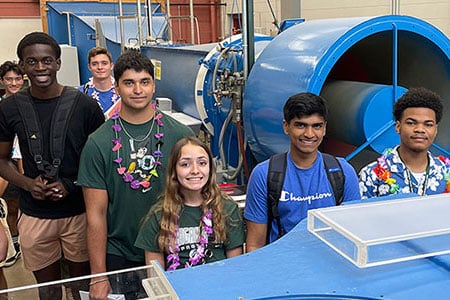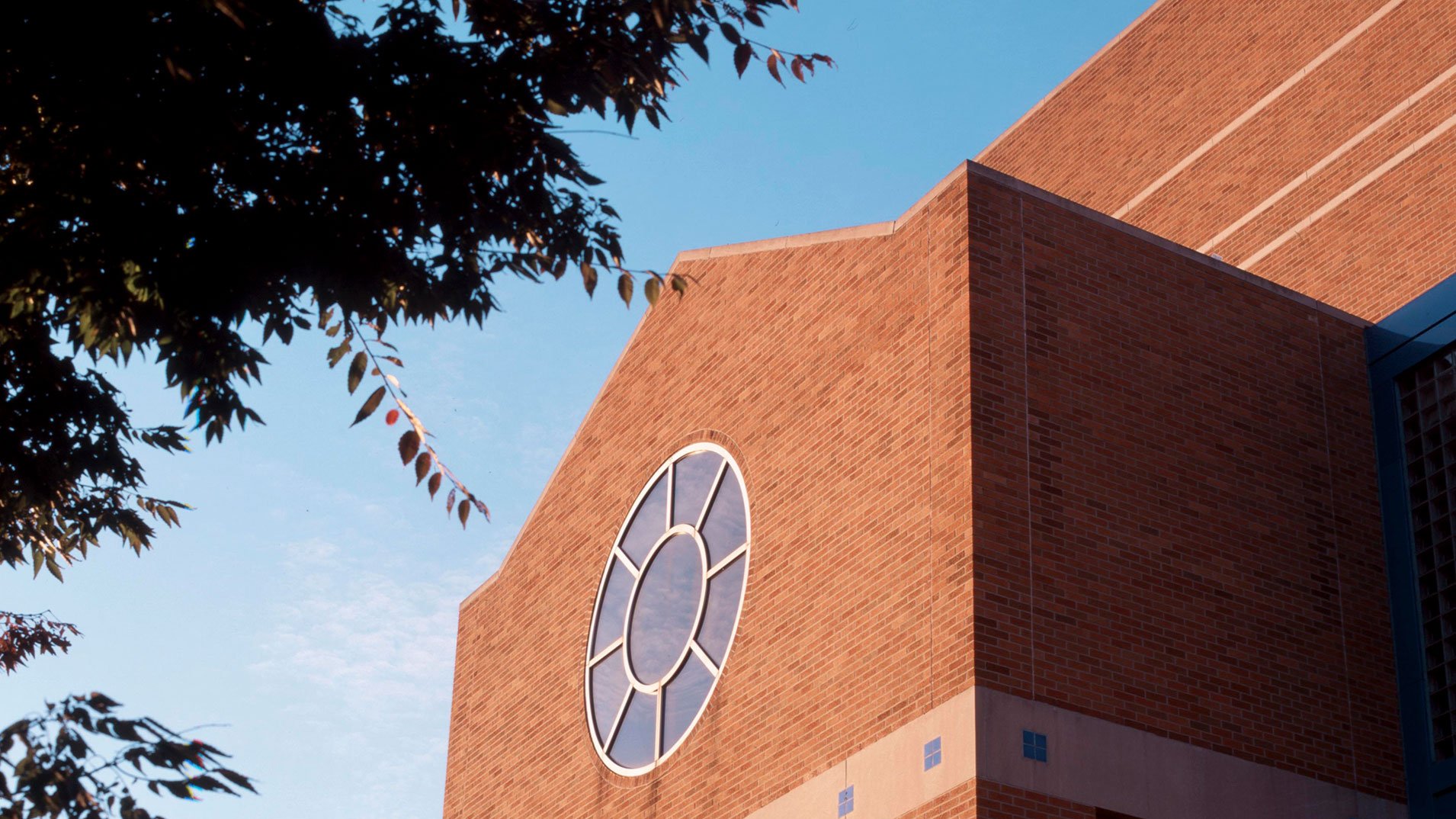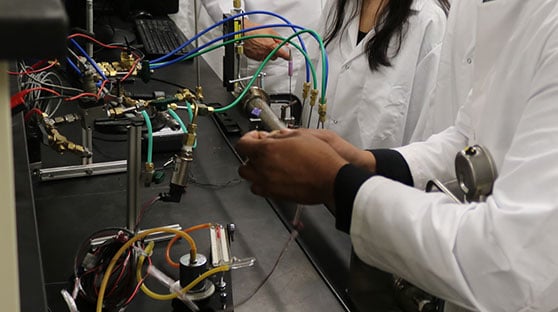College of Engineering Courses
- Engineering courses
- Experiential education courses
- Applied Engineering Sciences course
- Biomedical Engineering courses
- Biosystems Engineering courses
- Chemical Engineering and Materials Science and Engineering courses
- Civil and Environmental Engineering 100-499 courses
- Civil and Environmental Engineering 800-999 courses
- Computer Science and Engineering courses
- Electrical and Computer Engineering courses
- Mechanical Engineering 200-level courses
- Mechanical Engineering 300 and 400-level courses
- Technology Engineering courses
Other Courses
Overrides will be required for students who have taken EGR 393 and would like to get into EGR 392, 493, or 494.
MSU students may attend other institutions as Guest Students or Non-matriculated Students for short periods, either during the regular academic year or in the summer, for the purpose of earning credit for transfer to Michigan State University.
Students planning to attend accredited Michigan institutions should use the Michigan Uniform Undergraduate Guest Application form available below. Students who wish to attend non-Michigan institutions should obtain application forms from the host institution.
A student wishing to take courses at another institution should check the online transfer credit equivalency system to assure transferability.
A minimum of 2.0 must be earned in each course in order for the credit to be transferred to Michigan State University.
Michigan State University students may earn up to 60 credits from a two-year institution. However, last 10 of 30 credits must be completed with MSU credits.
MSU Students who wish to take courses at Lansing Community College do not need to fill out the Uniform Guest Application. Go directly to the LCC Application.
Generate your Michigan Uniform Undergraduate Guest Application (Login)
College of Engineering students attending through a sponsoring agency will sometimes need verification letters for their agency to confirm progress to degree, etc. If you are a sponsored student and need to supply a letter from your academic advisor, you must complete the student section of the letter you need, and provide to your academic advisor in a timely manner.
Deadlines
Must provide at least 10 business days; If this form is incomplete, request for letter will NOT be authorized
- Summer Session - February 15
- Spring Semester - October 15
- Fall Semester - March 15
Resources
Academic Policies
For purposes of enrollments and determining eligibility for certain student activities, a division of students by class is made by the Office of the Registrar at the end of each semester on the basis of the number of credits earned.
Division of Students by Class
- less than 28 (first-year)
- 28 to 55 (sophomore)
- 55 to 87 (junior)
- 88 and above (senior)
Students who have matriculated at Michigan State University and have achieved junior standing (56 semester credits) may not transfer additional credits to MSU from two-year institutions.
More info is available on the MSU Office of Financial Aid Enrollment Chart including the effect of enrollment credits on specific aid programs. The MSU Office of Financial Aid FAQ page offers information on dropping credits or withdrawing. Please note that disbursement rules may differ for summer semester.
Information regarding College of Engineering undergraduate scholarships can be found on the College of Engineering - Undergraduate Scholarships page.
Visit the MSU Office of Financial Aid Loans Information/Resources page for information on student loans.
Current MSU students considering transferring courses from another college or university as a Guest Student should follow the steps below to ensure that course work transfers to and is evaluated by MSU in a timely and accurate manner.
- Any course work that you complete elsewhere transfers to MSU only as credit; the grade does not transfer.
- You must earn at least a 2.0 (or "C" grade) in each transfer course at the guest institution for courses to transfer.
- You may not transfer credits from a community college to MSU once you have earned 56 total credits. For example, if at the end of this term, you have 50 credits earned, you may transfer back only up to 6 credits from a 2-year college.
- Students may transfer credits from a 4-year institution at any time before their senior year. Transferring credits during the senior year is possible, but restrictions apply, so see your academic advisor for details.
Important Procedures for Taking Courses Elsewhere
- Discuss appropriate courses with your academic advisor.
- Check the Transfer MSU website to determine if the course you want to transfer meets the requirement in your major.
- Check the schedule of the college/university you wish to attend to determine if the course is offered.
- If the institution is in-state, you must complete and submit the Michigan Uniform Undergraduate Guest Application. Print the returned form containing Registrar's seal and send The Guest Application to the institution you plan to attend.
- If you intend to take a course not listed on Transfer MSU, you should bring a copy of the college/university's catalog and course descriptions to the MSU teaching department that offers the equivalent course for evaluation. Phone number and office locations for academic departments can be found on the Schedule of Courses website.
- If the course you intend to take is a prerequisite to a course you plan to take at MSU the following semester, you must request an override for that course from the appropriate academic department. Check the department web site to determine its override request procedures.
- If you plan to take a math course elsewhere, you must request a math override in order to enroll in the course(s) for which math is a prerequisite.
- Transfer credit will not appear on your record for as many as 2-4 weeks (possibly longer for courses taken during summer semester) after MSU has received your transcript. If you plan to use transfer credits to reach junior standing, you will not receive word about admission to your engineering major until we receive official notice of your transferred credits from the Registrar's Office.
- After completing the course(s), request that an official transcript be sent to MSU in order to receive credit toward your degree. Have the transcript mailed to:
Transfer Credit Evaluation
Admissions Office
250 Administration Building
Michigan State University
East Lansing, MI 48824 - If you have any questions, please see your academic advisor.
Visit the MSU Office of Financial Aid Work-Study information page for more information.
The College of Engineering utilizes the Confidential Message Center to send important messages regarding such topics as college admission, academic warnings, etc. If you receive a message from the Confidential Message Center it will have a subject line that reads "Office of the Registrar Confidential Message" and you will be directed to a sign-in page. Sign in with your MSUNetID and password to retrieve your message. You may also retrieve your message from the Office of the Registrar's website (login)
You are given the option to delete messages from view, but you're not deleting messages from the system. You can retrieve past messages by clicking on the "View All Messages" button.
MSU Student Email Communications Notice can be found on the Technology at MSU Guidelines and Policies website.
Tuition, Fees and Refunds information can be found on the MSU Controller's Office website.
See the Registrar's Office Academic Calendar; for all important dates regarding enrollment and registration
After the first 1/14th of the term of instruction (the fifth class day of the Fall and Spring semesters), students must process adds and section changes at the teaching department and must obtain approval from the authorizing officers (Instructor, Assistant Dean, Academic Department Chair). Drops after the middle of the term of instruction must be processed by the Assistant/Associate Dean's office of the student's college. The last day for dropping courses with no grade reported is the middle of the term of instruction.
A hold may be placed to prevent you from doing one or more of the following: being admitted or readmitted, enrolling, becoming registered, receiving your diploma or certificate, receiving a transcript, or receiving financial aid. Among the reasons a hold may be placed are: past due financial obligations to any department, office, or unit of the university, the need to obtain academic advising, or as a result of judicial actions. A complete description of the reasons a hold may be placed and the actions that a hold may prevent can be found in the Academic Programs section of the University catalog.
In order to resolve, or clear a hold, you must contact the college/department/office which placed the hold.
If you have a hold which prevents enrollment you will not be able to adjust your schedule through the enrollment system. This includes enrolling in a course, adding, changing, or dropping sections. Enrollment holds will be listed on your monthly billing statements.
If you have a hold which stops transcripts, no transcripts will be given to you or persons or agencies outside the University. An exception may be granted by the Controller's Office, if the transcript is for a prospective employer.
If you have a hold which stops diplomas, your diploma will not be issued to you.
If you have a hold which stops admission, you will not be able to be admitted or readmitted to the University.
If you have a hold which stops financial aid processing, your financial aid application will not be processed either in whole or in part.
For a list of offices placing nonacademic holds visit the MSU Office of the Registrar's Hold Policy page.
The statement on Academic Standing of Undergraduate Students (ASUS) was designed to create an early warning system to prevent students from getting too deeply into academic difficulty. The university requires a cumulative grade point average (GPA) of 2.00 or above for graduation. The statement on ASUS establishes a system whereby at the end of any semester that a student's cumulative GPA falls below 2.00, the student is assigned to a warning status designated as probation.
Under the statement on ASUS, the term "probation" is the functional equivalent of an academic warning. Students placed on probation retain the right to participate in all university activities and retain all of the rights and privileges available to any student who is not currently subject to academic recess or dismissal.
In addition to the criteria contained in this statement on Academic Standing of Undergraduate Students (ASUS), undergraduate students who wish to be considered for federal financial aid must be making satisfactory progress toward the bachelor's degree as defined in the Financial Aid for undergraduates section of this publication.
Note: We strongly recommend that students meet with their advisor regularly to receive assistance with major selection, schedule planning, test-taking and study skills, utilizing resources, career planning, and much more.
Transferring to Michigan State University is competitive, but all of our majors accept transfer students each year. Highly qualified students wishing to be an MSU Spartan engineer are encouraged to apply! Most admission decisions will be made in late January and February. Therefore, priority is usually given to early applicants. Students interested in transferring to MSU as an engineering major should contact Mr. Drew Kim at (517) 353-7282 to make an appointment.
Transfer students must apply to MSU via the Office of Admissions process. Please visit our Future Engineers website for specific admission requirements for transfer students.
Transfer students with junior standing who entered majors other than engineering must complete at least 12 credits of Michigan State University courses to be admitted to a major in the College of Engineering, including at least 6 credits in mathematics, physical and biological sciences, and engineering for first-years and sophomores, and at least 10 credits in mathematics, physical and biological sciences, and engineering for juniors and seniors. These students are then considered for admission to an engineering major based on MSU grades using the criteria for internal students.
Calculating Your Combo Grade Point Average
Your cumulative GPA is an average of the grades you have received for all courses you have taken for credit at MSU. Your cumulative GPA can be found on your grade report each semester.
Your technical GPA is an average of the grades you have received for all your technical courses. Technical courses teach STEM (Science, Technology, Engineering and Mathematics) foundation topics and are often courses taken from the College of Engineering, College of Natural Science and from Lyman Briggs College. For example, STT 351 and ENT 205 are considered technical courses that are used in calculating your technical GPA.
Courses in the colleges of Engineering and Natural Science that are NOT INCLUDED in the technical GPA include:
- Courses beginning with ISB, ISP, or NSC
- EGR100, EGR 160, EGR 291
- MTH 1825, MTH 101, MTH 102, MTH 103A
- CSE 100, CSE 101
- LB 300 or higher courses, LB 126, LB 133, LB 181
- ME280, ME285, ME 300
- CE274
Your combo GPA is the average of your cumulative GPA and your technical GPA. To calculate, add your cumulative GPA and your technical GPA, then divide by 2. Your combo GPA is used for admission to the College of Engineering.
Download this Technical GPA Excel Spreadsheet to help calculate your cumulative GPA.
An Example:
J. Spartan has taken the following courses with the following grades (t=technical GPA course):
Course Credits Grade Credits x Grade= Point total
t ENT 205 3cr 3.5 | 3 x 3.5= 10.5
t CEM 141 4cr 2.5 | 4 x 2.5= 10
t CEM 161 1cr 3.5 | 1 x 3.5= 3.5
ISS 215 4cr 3.5 | 4 x 3.5 = 14
t MTH 132 3cr 3.0 | 3 x 3.0= 9.0
Total 15 cr / 47. 0 pts
Cumulative GPA: Multiply credits by the grade for each course, add these together, and divide by the total number of credits: (47 pts / 15 crs)=3.1333 GPA
Technical GPA: Multiply credits by the grade for each technical course, add these together, and divide by the number of technical credits: (33 pts / 11 crs)=3.000
Combo GPA: Average the cumulative and technical GPAs: (3.1333 + 3.000 = 6.1333 / 2)=3.0666
Note: Students should be aware that technical courses are counted twice, once in the cumulative GPA and then again in the technical GPA. Also, remember that numeric grades at MSU include 4.0, 3.5, 3.0, 2.5, 2.0, 1.5, 1.0, and 0.0, so to attain at least a 2.9000 Combined GPA, you need to earn mostly 3.0 or better grades in your courses.
The Credit-No Credit System is intended to allow students to study outside their major field of study without jeopardizing their grade-point averages. The full policy is available online. For students in the College of Engineering, CR/NC cannot be used on any course that is listed as part of the student's degree program. Students should confer with their academic advisor before making any decisions on CR/NC courses.
MSU students enrolled for summer courses like any other semester, whether the courses are offered on MSU's campus, off-campus, on-line or abroad. Check with your academic advisor about course selections from your program. For courses, visit the Schedule of Courses website, select "Off Campus" and the region close to you this summer. Courses are taught by MSU faculty/instructors---there is nothing to transfer. Course grades and credits will appear on your MSU transcript.
Visit the Summer Study website for more information.
Engineering Fee
The College of Engineering does not charge fees for individual classroom expenses such as lab fees for specific courses. An Engineering Program Fee is assessed to all undergraduate students that have been admitted to the College of Engineering to help cover the costs associated with Engineering computer labs, TA positions for classes, lab facilities in the departments, lab equipment upgrades and repairs, and student organizations and projects.
The College of Engineering assesses an Engineering Program Fee each semester to all undergraduate students that have been admitted to the College of Engineering.
The Engineering Program Fee differs depending on whether you are attending full- or part-time, and whether you are enrolling for Fall, Spring or Summer semesters. The Office of the Controller’s Student Accounts website lists the Engineering Program Fee under the “Tuition, Fee, Tax And Housing Rates” links for each semester as “SPECIAL PROGRAM FEES”
No. The Engineering Program Fee is applied just once to a student account each semester, regardless of how many majors or minors the student has.
The College of Engineering does not charge course fees on specific courses, but uses the Engineering Program Fee to maintain support for our labs, facilities, and shop intensive courses. The fee helps to cover the costs associated with:
- DECS support and equipment for computer labs in the Engineering Building, Wilson Hall, and Wonders Hall. Engineering computer labs are available only to students with Engineering accounts.
- TA positions for classes
- lab facilities in the departments
- lab equipment upgrades and repairs
- student organizations and projects.
More information about tuition and fees is available on the MSU Controller’s website.







